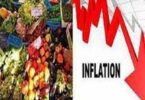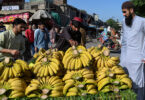F.P. Report
ISLAMABAD: Chairman Pakistan Industrial & Traders Associations Front (PIAF), Faheem Ur Rehman Saigol has warned the authorities that rising inflation continued to hurt economic growth, demanding a careful policy to keep it in control, as the prices of essential commodities continued to stay away from the reach of the financially vulnerable segments, with data showing the annual short-term inflation well above 40 percent.
In a statement issued on Sunday, he said that the government computes the Sensitive Price Indicator on a weekly basis to evaluate the price fluctuation of necessary commodities by evaluating the rates of 51 items collected from 50 markets in 17 cities of the country. The SPI report for the week ending on January 4 reflected an increase in the rates of 19 commodities, decrease in nine and stability in 23.
Quoting the data, PIAF Chairman Faheem Ur Rehman Saigol observed that trade and industry have suffered from the double-edged sword of food and energy prices with transport inflation peaking to a record 65% while the annual inflation rate increased to 24.9% in 2023.
The SPI for the current week ended on 04th January, 2024 increased by 0.81 percent, the PBS said in its report. Major increase is observed in the prices of Tomatoes (16.04 percent), Chicken (13.98 percent), Eggs (3.20 percent), Onions (3.04 percent), Bananas (2.13 percent), Pulse Gram (2.12 percent), Sugar (2.04 percent), Pulse Moong (1.68 percent), LPG (1.19 percent), Firewood (0.51 percent) and Georgette (0.23 percent).”
The year on year trend depicts increase of 42.86 percent, it added.
Pakistan’s rapidly depreciating national currency and its rising energy imports led to significant inflation, prompting the central bank to retain the policy rate at 22 percent last month to mitigate the situation.
The bank also informed in one of its recent reports to parliament it wanted to prevent high inflation from becoming entrenched in the coming months and hoped to bring it down to nearly 20 percent in the current fiscal year.
Faheem Saigol said that the inflation measured by the Sensitive Price Indicator (SPI) continued to increase in the wake of higher prices of food and energy despite a recent cut in the prices of petroleum products, as essential commodities have still not seen a decline in prices, leaving trade and industry frustrated.
The PIAF Chairman observed that the index spiked 38.28 percent when compared with the corresponding week of last year, as out of the 51 essential commodities covered by SPI, prices of 17 (33.33 percent) items increased, rates of another 17 decreased and prices of the remaining 17 items remained unchanged compared to the previous week. On a weekly basis, the price of tomato rose 6.28 percent, egg 3.48 percent, powdered salt 2.75 percent, cooked beef 1.06 percent, garlic 1.04 percent, tea (prepared) 0.73 percent, beef 0.39 percent and potato 0.35 percent.
Among non-food commodities, the electricity charges for Q1 rose 8.59 percent, energy savers 0.55 percent, shirting 0.47 percent and liquefied petroleum gas (LPG) 0.31 percent, according to the PBS.
The year-on-year trend depicted price increases in the range of 58-137 percent among different items. Faheem Saigol said that Pakistan has been facing a high inflation for the past couple of years partly due to massive depreciation of the rupee against the US dollar and partly due to a surge in global commodity prices like energy cost. The country largely meets its energy demand through expensive imports.
He stressing the need for putting the economy on a sustainable growth trajectory by providing incentives to the industry, lamented that the economy is facing multiple challenges of falling exports, high inflation, low growth and declining foreign reserves, with fiscal accounts under immense pressure on account of heavy interest payments.
Businessmen Panel (BMP) chairman said that the drop shows the government would find it difficult to achieve the industrial growth and export target, leading to more pressure on foreign exchange reserves of the country.







